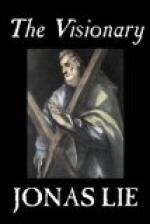After an hour or two out in the storm, the fire in his veins is subdued, and home he comes once more a quiet, grave man, carefully puts his stick and goloshes in their accustomed places in the hall, and is pitied by his wife, who has been anxious about him, and is now helping him off with his wet things. Strange to say, he himself, in spite of adverse circumstances, is in capital spirits that evening, and has such a number of things to tell about this storm—every thing of course, as becomes the occasion, in the form of anxiety lest damage should be done, or fire break out in the town.
It was in such weather that I—a practising doctor, and having, as such, good reason, both on my own account and on that of others, for being out at all times of the day or night—one rainy, misty, stormy October afternoon, roamed the streets of Kristiania, finding pleasure in letting the rain dash in my face, while my mackintosh protected the rest of my person.
Darkness had gradually fallen, and the lighted gas-lamps flared in the gusty wind, making me think of the revolving lights on a foggy night out on the coast. Now and again an unfastened door swung open and shut again, with a bang like a minute gun. My inward comment on these occasions was that, even in our nervous times, there must still be an astonishing number of people without nerves; for such bangs thunder through the whole house right up to the garret, as a gust fills the passage, and doors fly open and shut, shut and open; everybody feels the discomfort, but no one will take the trouble to go down and fasten the origin of the evil; the porter is out in the town, and as long as he is away the inmates must put up with an absence of all domestic comfort.
It was just such an unfastened, unweariedly banging door that led to what I have to relate.
As I passed it, I heard a voice, which seemed familiar to me, an old beloved voice—though at first I could not recall where I had heard it—calling impatiently to the porter. It was on the subject of the banging door. The man was evidently the only nervous individual in that house; at any rate, the porter was not, for he appeared to be quite wanting in feeling both for his door and for the man who had interested himself in it, and was now fumbling in vain with a latch-key, which did not appear to fit.
At last the porter came out of his subterranean hole, and it was during a little altercation between the now placable and gentle voice, sorry for its previous irritability, and the growling porter, that with all the power of an awakened recollection I recognised my old friend of student-days, David Holst, with whom I had lived three of the richest years of my youth.
“If that is you, David, you must let me in before you lock the door!” I cried, just as I should have done in the good old days, twenty years before.
The door opened wide, and a warm shake of the hand from the dark advancing form, told me that he had not needed to search so long through the chambers of his memory as I, but had recognised me at once.




